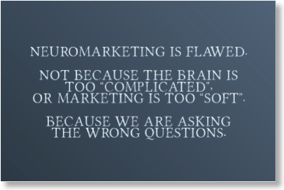Can neuromarketing shed its ethically dubious reputation?

Beyond the research question itself, it got me thinking again about the thorny ethical issue concerning neuromarketing.
As someone who came to marketing as an outsider, I can relate pretty well to those concerns. Indeed, for the majority of my time at Haas, my research mostly concentrated on basic science issues around economic and consumer decision-making. Part of this is due to the demands of being a junior faculty, but another part is the discomfort that I feel myself at the ostensible goals of neuromarketing.
However, it's become increasingly clear to me that, like a number of other challenges facing neuromarketing (some of which I talked about here), this is reflective of the mixed feelings that society as a whole feels for marketing, and businesses in general. Often the goals of businesses are framed as being in direct opposition to those of the consumer. This affects even the language that businesses use in talking about consumers, for example war metaphors such as “we take aim at our target market” or “we win customers".
It shouldn't be all that surprising then that there is unease about marketers having better tools in understanding our wants or predicting our behavior. Just consider the brouhaha over the Facebook emotion study.
Marketing strategists talk all the time about “aligning interests of stakeholders”. It’s time neuromarketing puts that into practice.
But it doesn’t have to be that way. In fact, there are many areas where consumer and marketers goals are quite compatible. When people talk about Apple understanding and anticipating their needs, they don’t mean that in a pejorative way.
In fact, it's positively liberating when these conflicts of interests start disappearing. I don't think I'm being naive when I say that everyone in this case wants the fans to have a good time, the Raiders, the fans themselves, and us researchers! Whatever comes out of these studies (that’s for another entry), nobody should be unhappy (except the 49ers… I kid, I kid! I, erm, like Chip Kelly?).
Marketing strategists talk all the time about “aligning interests of stakeholders”. It’s time neuromarketing puts that into practice.
The Problem with Neuromarketing
Neuroscience either tells me what I already know, or it tells me something new that I don’t care about”.As criticisms go, it is quite persuasive. It fits with the common view of technology where the shiny new toy replaces the old cruddy way of doing things. But whereas years ago I would have jumped to take on the challenge and “show those !@#$%s”, I increasingly view such statements as something a trap, if (sometimes) a well-intentioned one.

The problem, not always but often, is that it lets someone else define the objective. Now you are solving someone else's problems, rather than what you are actually equipped to solve. Moreover, the problem with “other people’s problems” is that they are often intractable, or where the value of the returns is one-sided.
For example, I’ve had people ask for something like this, “I think our brand efforts are really reaching our target audience, but it’s not showing up in the standard metrics. Do you think you can find something in the brain that would show our effectiveness?"
Lest you think this is just practitioners lacking in scientific knowledge, here’s some from academics. “This type of behavior doesn’t make sense under any of our standard models. Maybe there’s something hardwired in our brains that produce these weird choices?” Or to paraphrase my favorite, Hey, I have this theory, can we test to see whether there’s support for it at the neural level?”
So yes, I think the current state of neuromarketing has many shortcomings, but I thnk the biggest one is that we’ve been letting others define our questions.
Field Notes from Beijing
Vertical integration of scientific research. Although disciplinary boundaries are still much more pronounced in China than the US, there is something really exciting about the vertical integration in the various disciplines. I saw a talk where a single group went through genetic screening in thousands of patients, followed up with a set of studies involving interrogation of gene candidates using animal models and in vitro approaches.
This has a definite beauty and logic to it, since many of our most pressing research questions are problem-based as opposed to disciplinary based. One can get out much of the value of interdisciplinary research by simply stacking the different disciplines together. Conversly, I can’t imagine what grant reviewer would say if I proposed to do something like this in the US.

Undoubtedly the air pollution. After a couple of days with a gloriously blue sky, courtesy of a Siberian weather system, I got the full Beijing treatment of code red air quality. That meant wearing masks even when inside. Hopefully this is the darkest hour before it gets better. I even overheard migrant workers talking about going back to their villages because of the pollution. Surely the developmental curve has caught up to the point that economic development – life quality tradeoff is moving towards the latter.

Crampons! Ice axes! Jokes about drinking your own urine! It’s ice climbing at the foot of the Great Wall!
There is something hugely satisfying and soothing about the dull thud of the ice axe into the ice. It was much more accessible than I had thought, but of course I was with serious professionals. I think I just found my new hobby.
Neuromarketing vs. Status Quo
Here’s what each looks like to me:
- Status quo: Assume that consumer can be trusted to tell us the truth, at least most or all of the time. Otherwise it becomes difficult to convince clients to buy what we have to sell.
- Neuromarketing: Assume that consumers cannot be trusted, at all. Otherwise it becomes difficult to convince clients to buy what we have to sell.
Assume that consumers cannot be trusted.
It doesn’t require too much common sense to see what these positions are incompatible because of how each positions their products and services. The more reasonable, but maybe not as sexy or eye-ball attracting, position has got to be:
- Neuromarketing 2.0: Sometimes consumers can’t or won’t tell us the truth. We will help you figure out when those sometimes are.
Oh, we might even be able to tell you what consumers are not revealing, but don’t trust us until we can validate it in some way.
Science of Business, Business of Science
What is this blog about?
Two things.
1. Science of business: How can we use science to improve the current state of managerial practice, foster innovation, and reduce ethical violations? This includes scientific thinking for example through the use of data and experimentation. It also includes attempts to introduce entirely new types of data from the natural sciences, such as neuroscience and genetics. What are the areas of promise, of hype? How should we evaluate claims? How can we make progress?
2. Business of science: How can we improve efficiency and effectiveness of current scientific enterprise? Scientists are increasingly being asked to show the bottom line impact of their research, but how should we measure value of scientific research? How do we balance competing demands of basic and translational research?
Why do we need yet another blog about this?
Because these topics don’t seem to be discussed much in the blogosphere. Email me if you think someone is doing it better. I will either a) try harder, b) fold and use the time for something more productive, or (c) respond with some snarky defensive response (I kid, I kid!).Why are you qualified to write this?
Through some interesting and not-so-interesting career quirks, I ended up with training in economics, neuroscience, and psychology, and am now teaching at a business school. This means that I spend part of my day wearing my bschool hat, which involves me thinking and teaching marketing, especially topics like marketing research and the role of data in business. The rest of the time is spend with me wearing my basic scientist hat, where I direct the Neuroeconomics Lab, where my research team and I conduct research on the neuroscience and genetics of economic decision-making.Over the years, I find myself increasingly comfortable at putting on my bschool hat while thinking about science, and putting on my science hat while thinking about business. I’ve also come to realize that there is a lot of each area can learn from the other, hence this blog.